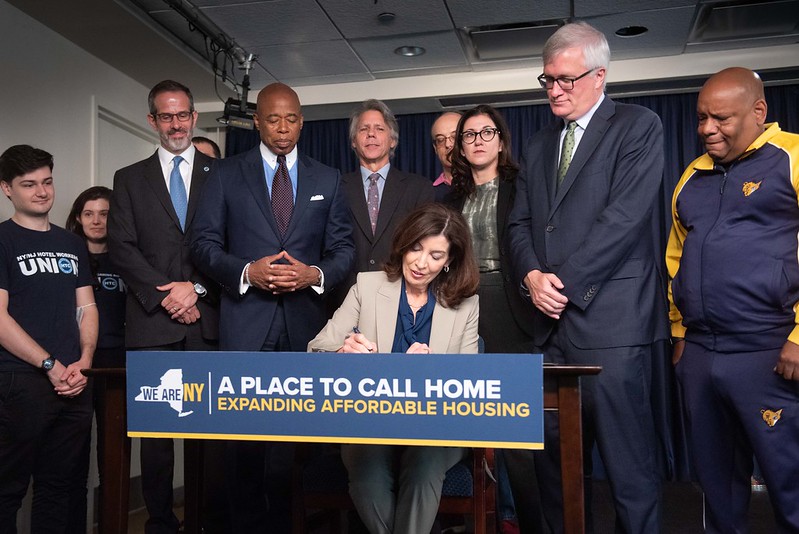
Gov. Hochul signs a bill for hotel to housing conversions (photo: Michael Appleton/Mayor's Office)
In 2016, the City Council adopted mandatory inclusionary housing (MIH), city legislation requiring for the first time that in any rezoning or other regulatory change that created or expanded the right to build apartments — in a neighborhood, or in a single building — at least 20% of the new housing had to be affordable, and affordable in perpetuity.
The foundational concept was simple: if government gives a developer the ability to build more residential units, it is entitled to ask in return for a guarantee that the project will include the mix of incomes that makes the city’s neighborhoods thrive. Prior policies of incentivizing new affordable housing, either through zoning or tax programs, simply had not generated anywhere near the number of units necessary to keep up with demand or promote diverse neighborhoods. With the market continuing to build as many market-rate apartments and luxury condominiums as possible, we knew our city could no longer claim to be a city for everyone if we did not change the rules of the game.
We co-authors had different perspectives from our varied perches — one of us an advocate and nonprofit leader, one the City Council’s chair of the zoning committee, and one the city’s housing commissioner (who worked alongside the deputy mayor for housing and economic development and the chair of city planning). But we all agreed upon one thing: MIH would set a new standard — a floor, not a ceiling, for affordable residential development.
Fast forward seven years. The city was the center of a global pandemic that destroyed families, wiped out people’s livelihoods at an unimaginable scale, and emptied out hundreds of once-bustling business district buildings as office workers went remote. And yet despite the job losses and reports of people leaving the city in droves, rents keep rising and there are even fewer apartments available for low- and moderate-income families. We have a very long way to go on the road to a truly equitable recovery.
But as the state and city lay out plans to make it much easier to convert underused commercial space to residential units, which the city estimated could house tens of thousands of New Yorkers, the notion of mandating affordability has fallen by the wayside. Indeed, the commercial buildings that have already been announced as in the process of converting to residential uses include only market-rate condos and rentals with no affordable units.
Legislation being considered as part of Albany’s big budget package, likely wrapping up in less than a week, would expand the right for developers to convert buildings from commercial to residential — but with zero requirements for permanently affordable units.
The areas that will primarily be affected by the state proposal — downtown Brooklyn, downtown and midtown Manhattan, and Long Island City — currently have very few affordable apartments that middle- and low-income New Yorkers could ever dream of renting. We know that it is expensive and difficult to convert offices to apartments. But we also know it is expensive and not pragmatic for the state and city to be solely responsible for building affordable housing.
We established seven years ago that incentives are no substitute for requirements. We also know from the MIH experience that adding requirements for affordability will not stop construction. More than 10,000 permanently affordable MIH apartments had been approved, with more than 4,000 already completed or under construction, by the end of 2021. Further, because of MIH, high-end neighborhoods like Chelsea/Clinton, Brooklyn Heights/Fort Greene, and Gowanus have already added, or have plans to add, thousands of new homes for low- and middle-income families.
So if New York passes a law that will end up producing thousands of luxury apartments that only the wealthiest can afford, and resulting in zero permanently affordable homes for hard-working regular New Yorkers, then what will we have done?
The solution isn’t rocket science. The city’s MIH requirements must be included in any state legislation that expands rights to commercial to residential conversions.
***
Vicki Been is a former New York City Deputy Mayor for Housing & Economic Development and Commissioner of the New York City Department of Housing Preservation and Development. David Jones is President & CEO of the Community Service Society of New York. Donovan Richards is Queens Borough President and a former member of the New York City Council.
***
Have an op-ed idea or submission for Gotham Gazette? Email This email address is being protected from spambots. You need JavaScript enabled to view it.




